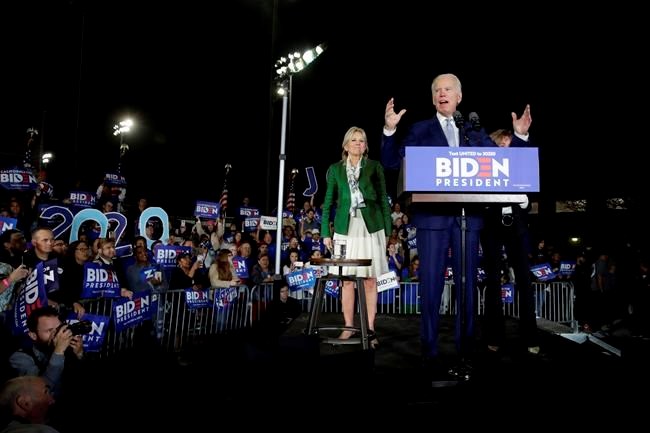WASHINGTON — Joe Biden's no kid, but he knows how to stage a comeback.
The former vice-president, whose bid for the Democratic presidential nomination was on life support two weeks ago, now finds himself on an ideological collision course with self-styled political revolutionary Bernie Sanders after a convincing South Carolina win catapulted him into a dominant primary performance on Super Tuesday.
Many had given him up for dead last month in Nevada when Biden, 77, tried to conjure comparisons to Bill Clinton's out-of-nowhere nomination in 1992, the year the former Arkansas governor christened himself the "Comeback Kid" in New Hampshire, scored a pivotal win in Georgia and went on to dismantle his rivals.
The night before the Georgia primary, a desperate Clinton turned to Gordon Giffin, a key adviser in the state and future U.S. ambassador to Canada, and asked for his prediction.
"You're going to get 60 per cent of the vote," Giffin replied. "He said, 'Well, don't repeat that in public, because I don't need 60 per cent of the vote, I only need 51.'
"And then, he looked at me and he said, 'And if I lose tomorrow, it's over.' We were that close to Bill Clinton not making it."
Biden, who has staked his campaign on his experience as Barack Obama's right-hand man, is still a long way from clinching the Democratic nomination. But the barriers have been falling away with breathtaking speed.
Pete Buttigieg, the one-time mayor of South Bend, Ind., whose unlikely campaign finally ran out of steam in South Carolina, called it quits on Sunday, followed the next day by Minnesota Sen. Amy Klobuchar. Both endorsed Biden.
Former New York mayor Mike Bloomberg — his multimillion-dollar ad blitzes and dismal debate performances yielding nothing but the six delegates of American Samoa — followed suit Wednesday after Biden laid claim to at least nine of the 14 states on offer, including delegate-laden Texas, Klobuchar stronghold Minnesota and a southern sweep that included Virginia, Arkansas, Tennessee, North Carolina and Alabama.
"I am clear-eyed about our overriding objective, and that is victory in November — not victory for me or our campaign, but victory for our country," Bloomberg told a rally in New York City. "I've always believed that defeating Donald Trump starts with uniting behind the candidate with the best shot to do it, and after yesterday's race, it is clear that candidate is my friend and a great American, Joe Biden."
Biden even won Massachusetts, where progressive challenger Elizabeth Warren posted a disappointing third in her home state. Warren was reportedly meeting with advisers Wednesday, fuelling speculation about how much longer she might stay in the race, and whether she'd support a rival if she gets out.
That leaves just Sanders, who claimed Utah, Colorado and his home state of Vermont, and was enjoying a comfortable lead in still-counting California, a liberal bastion of young Bernie supporters where 415 pledged delegates are up for grabs.
"My guess is that after California is thrown into the hopper, it's going to be pretty close ... I think we go forward basically neck and neck," Sanders said, framing Biden as a politics-as-usual establishment candidate as he predicted a dogfight over free trade when the race shifts to Michigan later this week.
"I think some of the issues that the people of Michigan are concerned about are trade," Sanders said. "They were devastated by trade agreements like NAFTA and PNTR (Permanent Normal Trade Relations) with China — trade agreements which I vigorously opposed, and which Joe Biden supported."
Sanders, whose campaign strategy aims to mobilize young, disenfranchised voters, admitted that he's not been satisfied with the results of that effort so far.
"We're making some progress, but historically, everybody knows that young people do not vote in the kinds of numbers that old people vote in. I think that will change in the general election, but to be honest with you, we have not done as well in bringing young people into the political process. It is not easy."
Like Clinton in 1992, Biden's surge had a lot to do with his popularity with black voters, who lined up behind the former vice-president in South Carolina after he won the coveted endorsement of Rep. James Clyburn, one of the state's most powerful political figures.
"He did not have the fundraising prowess that other candidates had," Clyburn said Wednesday on CNN. "A victory or two would cure that. So when he won the South Carolina primary and won it so decisively, overnight his money problems got cured."
To be sure, a well-timed win in a single primary race can literally change everything. Just ask Bill Clinton.
"By the way, we got 59.6 per cent of the vote the next day, which made me brilliant," Giffin joked.
"I'm smart and I have a long background in Canada, but one of the reasons why I was the ambassador to Canada was the Georgia primary in 1992."
This report by The Canadian Press was first published March 4, 2020.
— Follow James McCarten on Twitter @CdnPressStyle
James McCarten, The Canadian Press

